How to clean patio slabs without using a pressure washer, to avoid potential damage
Follow these simple cleaning steps to give your patio a spring clean without blasting the slabs

Emily Smith
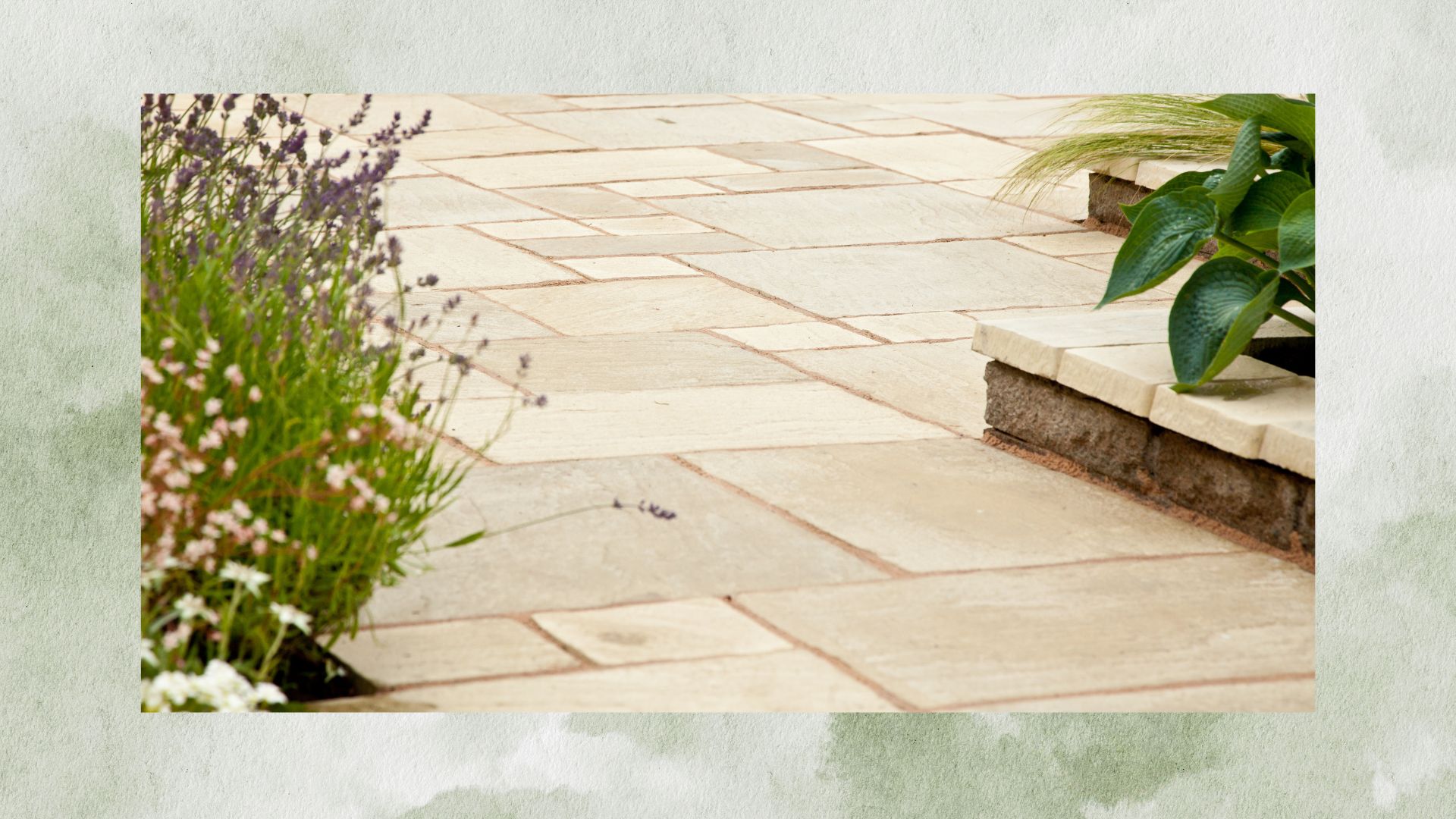
Sign up to our free daily email for the latest royal and entertainment news, interesting opinion, expert advice on styling and beauty trends, and no-nonsense guides to the health and wellness questions you want answered.
You are now subscribed
Your newsletter sign-up was successful
Want to add more newsletters?

Daily (Mon-Sun)
woman&home Daily
Get all the latest beauty, fashion, home, health and wellbeing advice and trends, plus all the latest celebrity news and more.

Monthly
woman&home Royal Report
Get all the latest news from the Palace, including in-depth analysis, the best in royal fashion, and upcoming events from our royal experts.

Monthly
woman&home Book Club
Foster your love of reading with our all-new online book club, filled with editor picks, author insights and much more.

Monthly
woman&home Cosmic Report
Astrologer Kirsty Gallagher explores key astrological transits and themes, meditations, practices and crystals to help navigate the weeks ahead.
It's time to start sprucing up the garden ready for outdoor enjoyment. Luckily, tackling how to clean patio slabs and tiles is an easy task to get you started on your exterior maintenance chores this spring.
Cleaning the patio slabs, along with giving the grass its first cut of the year, planting grass seed, cleaning the BBQ, and washing down your best outdoor furniture are all part of essential gardening upkeep to ensure your outdoor living space looks in tip-top condition ahead of any planned garden parties.
While blasting the patio with a pressure washer can be a satisfying activity for quick results, it's not the best method for cleaning patio slabs and exterior tiles because of the risk of high pressure damaging the stone and mortar. Instead, experts recommend a gentler approach.
How to clean patio slabs without a pressure washer
When sorting the garden out, getting the patio looking pristine is a fairly easy task, even without a pressure washer. Similar to how easy it is to clean garden decking without resorting to using a harsh power washer.
Here's our expert step-by-step guide to getting the job done in no time, using a simple homemade patio cleaner and a little elbow grease.
What you'll need:
- Garden broom: we recommend the JVL Heavy Duty Outdoor Yard Sweeping Brush, £23.09, at Robert Dyas
- Bucket
- Dish soap
- White Vinegar
- Gardening gloves: we recommend the Tough Touch Gloves, £29.95, at Sarah Raven
- Hard bristle scrubbing brush
- Optional: Hand Patio Weeder: We recommend the Carbon Steel Hand Patio Weeder, £8.99 at Amazon
- Optional: laundry detergent, oxygen bleach, or dedicated patio stain remover
- Optional: Patio sealant

RRP: £10.99 | This handy tool makes light work of removing any weeds growing in the joing sof your patio slabs.
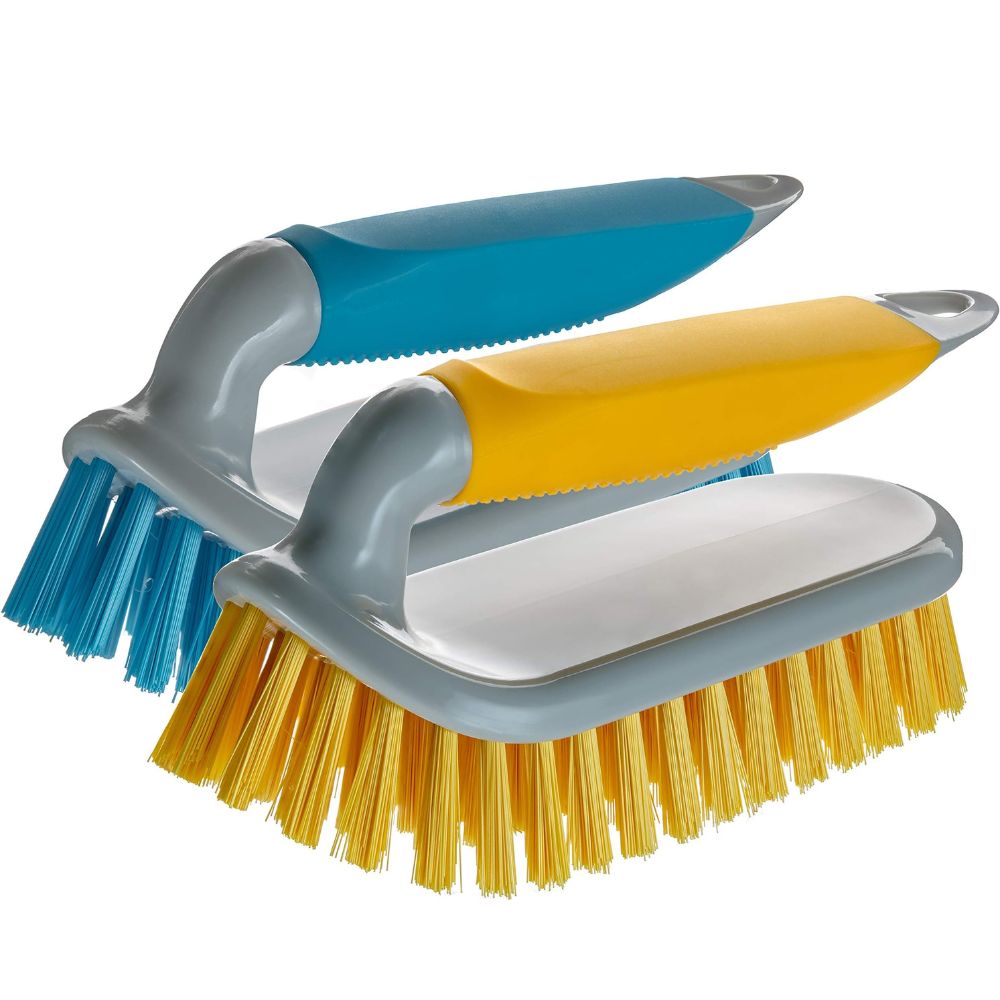
RRP: £13.95 | Whatever it is you're scrubbing in your garden, these helpful brushes with non-slip soft grip handles will make the task much easier. They're perfect for tackling stained paving slabs.
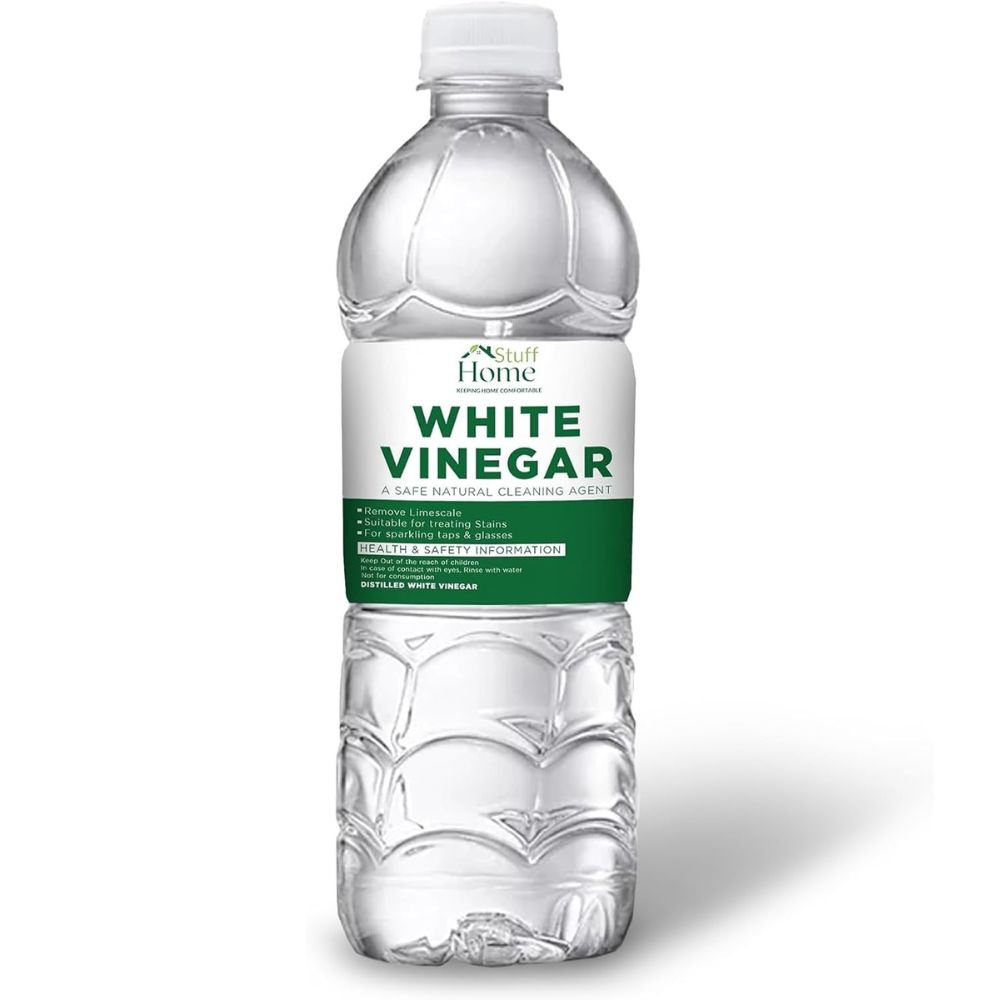
RRP: £5.99 | Another key cleaning product, white vinegar is a brilliant, gentle cleaner that will make quick work of breaking down dirt and killing bacteria whilst also being gentle on various surfaces.
1.Clear the area
Similar to how you would declutter your home before cleaning a room, before you can start the cleaning process, it's best to ensure you have a clear patio area.
Sign up to our free daily email for the latest royal and entertainment news, interesting opinion, expert advice on styling and beauty trends, and no-nonsense guides to the health and wellness questions you want answered.
Removing any furniture or garden tools and accessories ensures every inch of the patio is exposed to ensure maximum cleaning potential. The same applies when you're looking to clean artificial grass or garden decking.
“First, you should remove debris and any furniture from the surrounding area," advises Rowan Cripps, founding director and paving expert at Infinite Paving. "Failure to do so could lead to damaged furniture or obstructions you could trip over, so clearing the perimeter and giving it a good sweep is essential!”
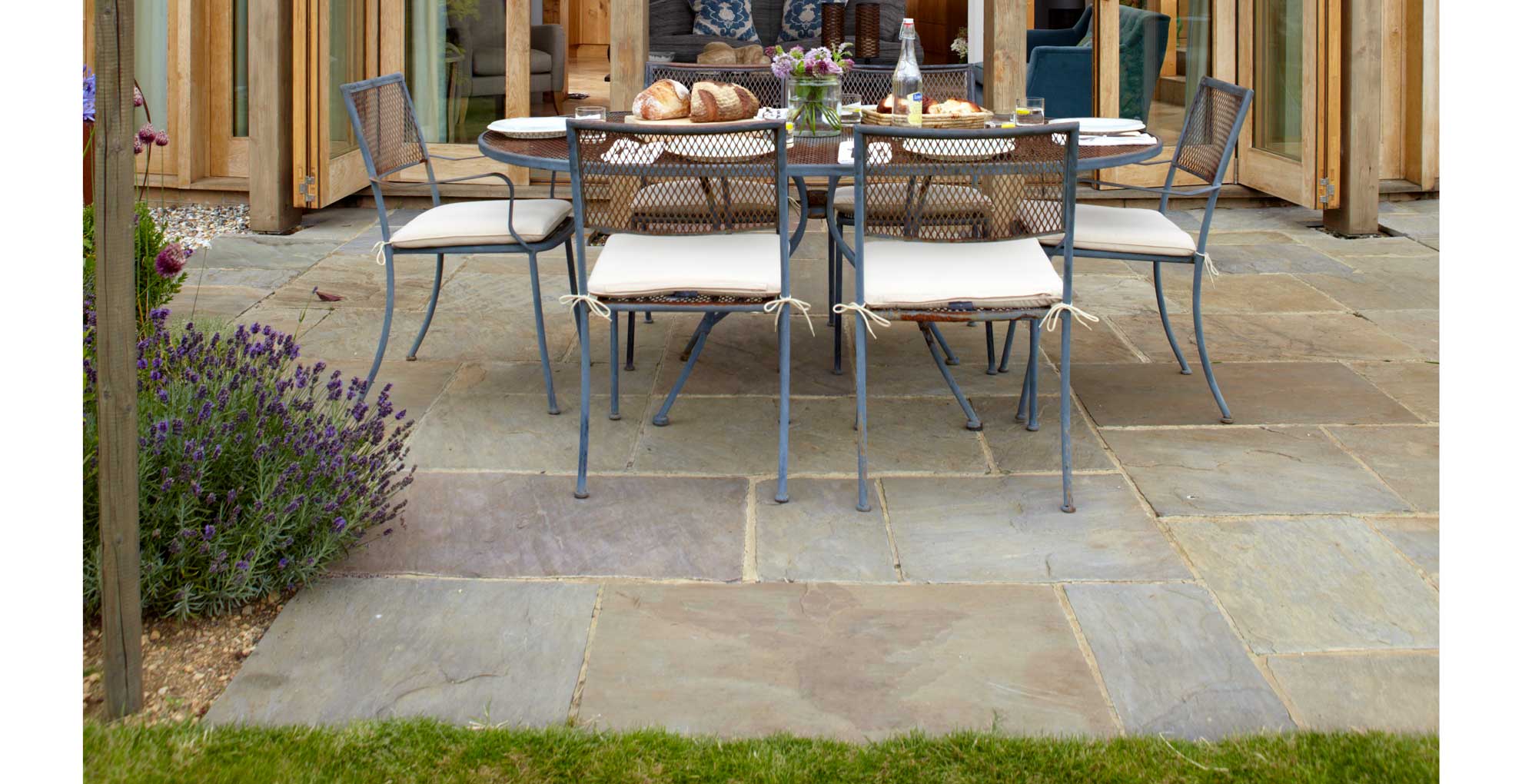
2. Remove weeds and leaves
Once the area is clear, it'll be easier to see any fallen leaves, weeds, or moss that may have accumulated over the winter months. Removing these before you start cleaning avoids grounding them down and effectively scrubbing the green pigment into the stones, which could potentially stain, particularly on very porous materials.
To clear leaves, use a hard-bristle broom to sweep them into a pile to clear. It's easiest to get rid of weeds and unwanted deposits of greenery by hand. Put on a pair of gardening gloves and remove the weeds, placing them in a garden trug as you go.
We would always recommend trying a natural solution, such as WeedKil Glyphosate Free Weed Killer at Amazon, as it contains fast-acting organic ingredients that are harmless to children and pets once dry.
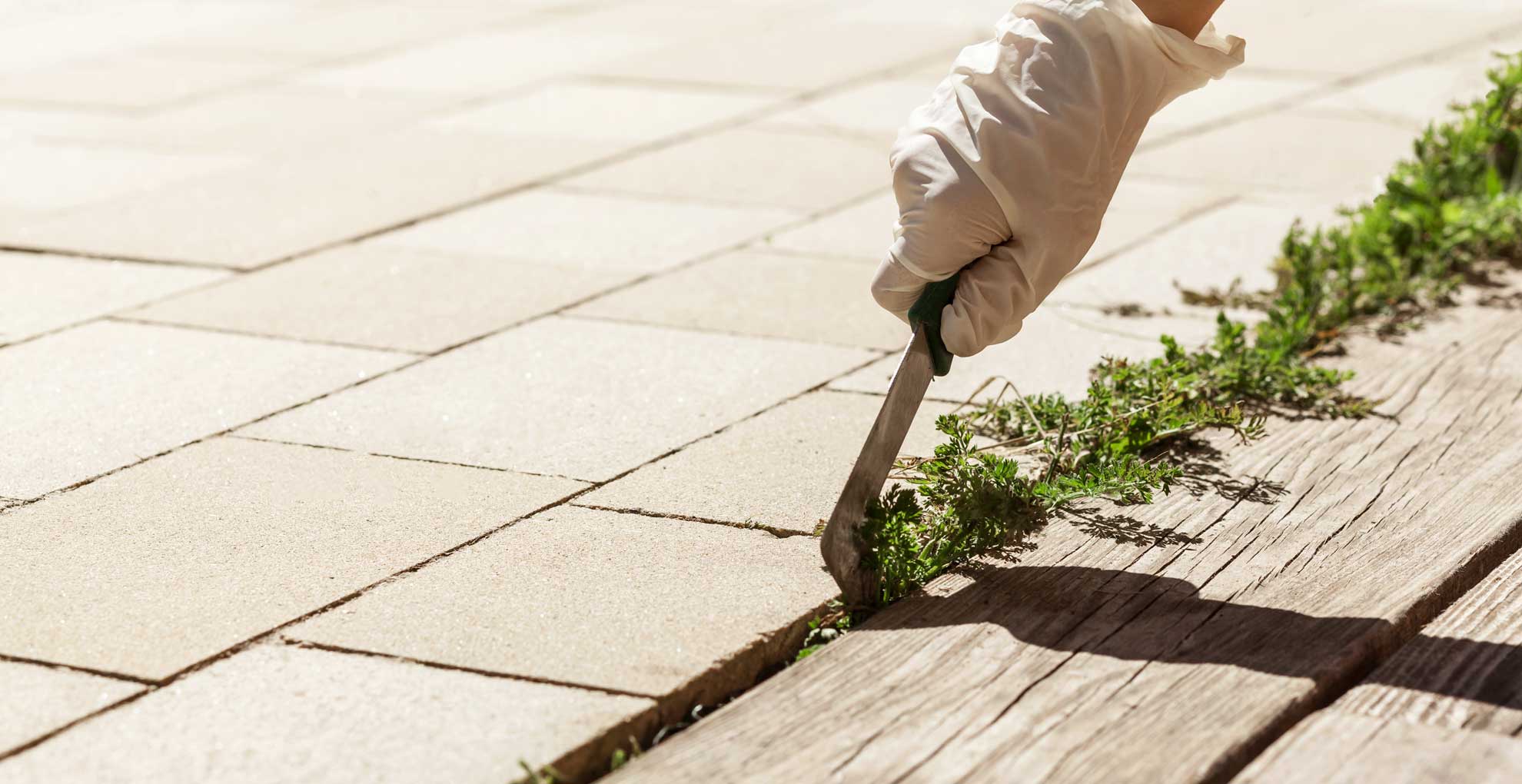
3. Pre-treat stains
Similar to when cleaning carpets, it is best to treat and clean stains directly to get optimum results. “Before you apply a cleaning solution to your stones, you should lay the groundwork for tougher stains," advises Rowan.
"Applying products such as laundry detergent, oxygen bleach (not chlorine bleach), or dedicated stain remover will help to tackle stains directly – just make sure to avoid adding too much bleach, as this could damage the stones.”
4. Mix a natural cleaning solution
Depending on how dirty your slabs are, one of the most effective ways to clean your patio is with the old-fashioned soapy water method. A mix of dish soap and warm water will help to lift stubborn mud and any buildup of debris.
"Next, prepare a cleaning solution using warm water and a strong but safe cleaning agent. For general grime, mix a few drops of dish soap with warm water," instructs Petar Ivanov, gardening expert at Fantastic Gardeners.
"For tougher stains or algae, mix equal parts white vinegar and water or use a specialised patio cleaner containing sodium hypochlorite or benzalkonium chloride. Just make sure to test it on a small patch first to make sure it doesn’t discolour the slabs," he adds.
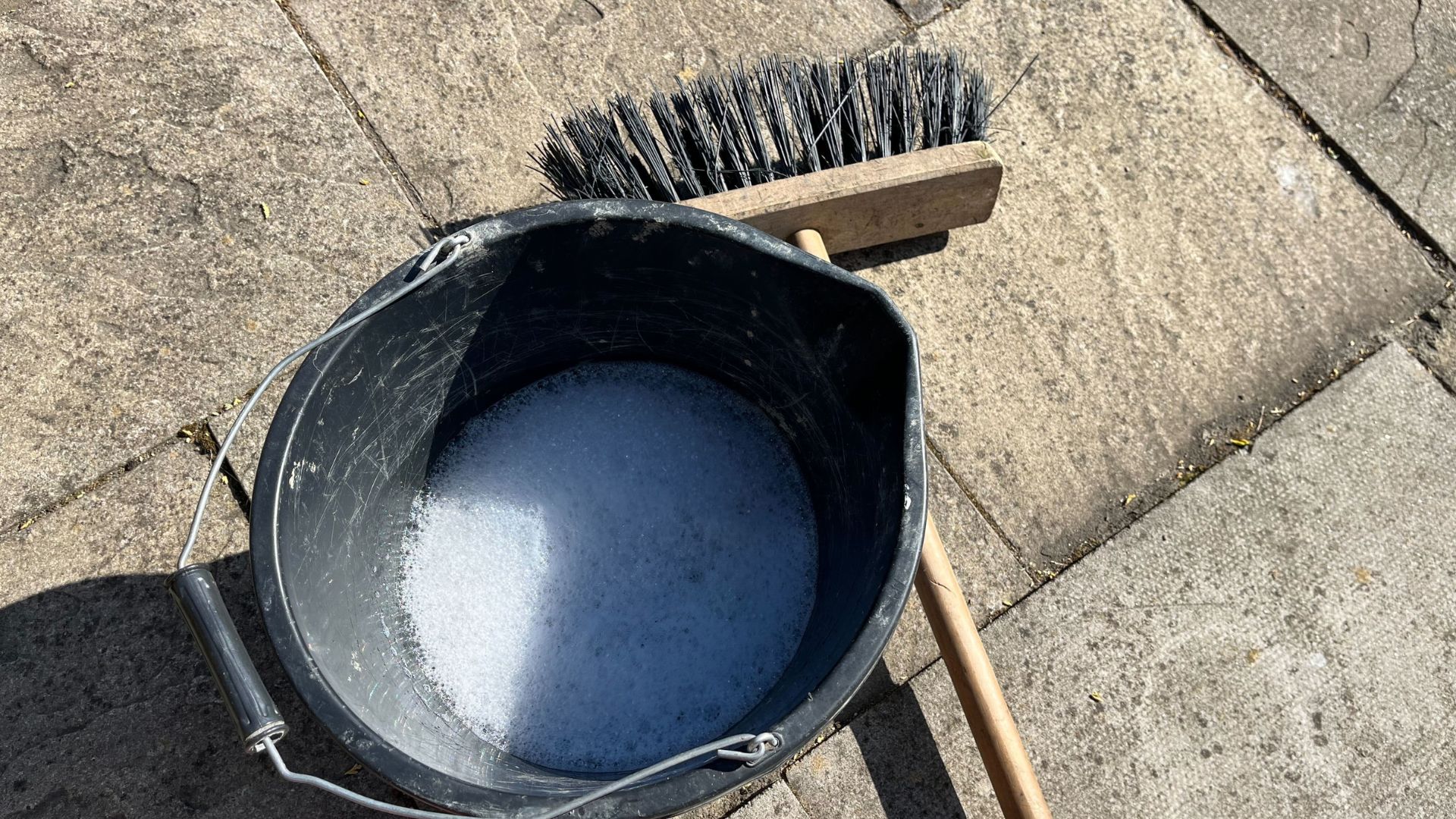
5. Scrub the solution into the stones
Use your cleaning solution to wet the patio surface with the solution and scrub it clean.
“Using a brush with stiff bristles, scrub the paving stones to agitate your cleaning solution, applying pressure to any stubborn stains," says Rowan. Be sure to work in manageable-sized sections at a time.
"Add some extra water to the surface and scrub to loosen the dirt and debris," suggests Colin Lincoln-Evans, buyer at Tile Mountain. "Use a sponge to absorb any excess water, and repeat these steps until you’re happy you’ve cleaned the surface."
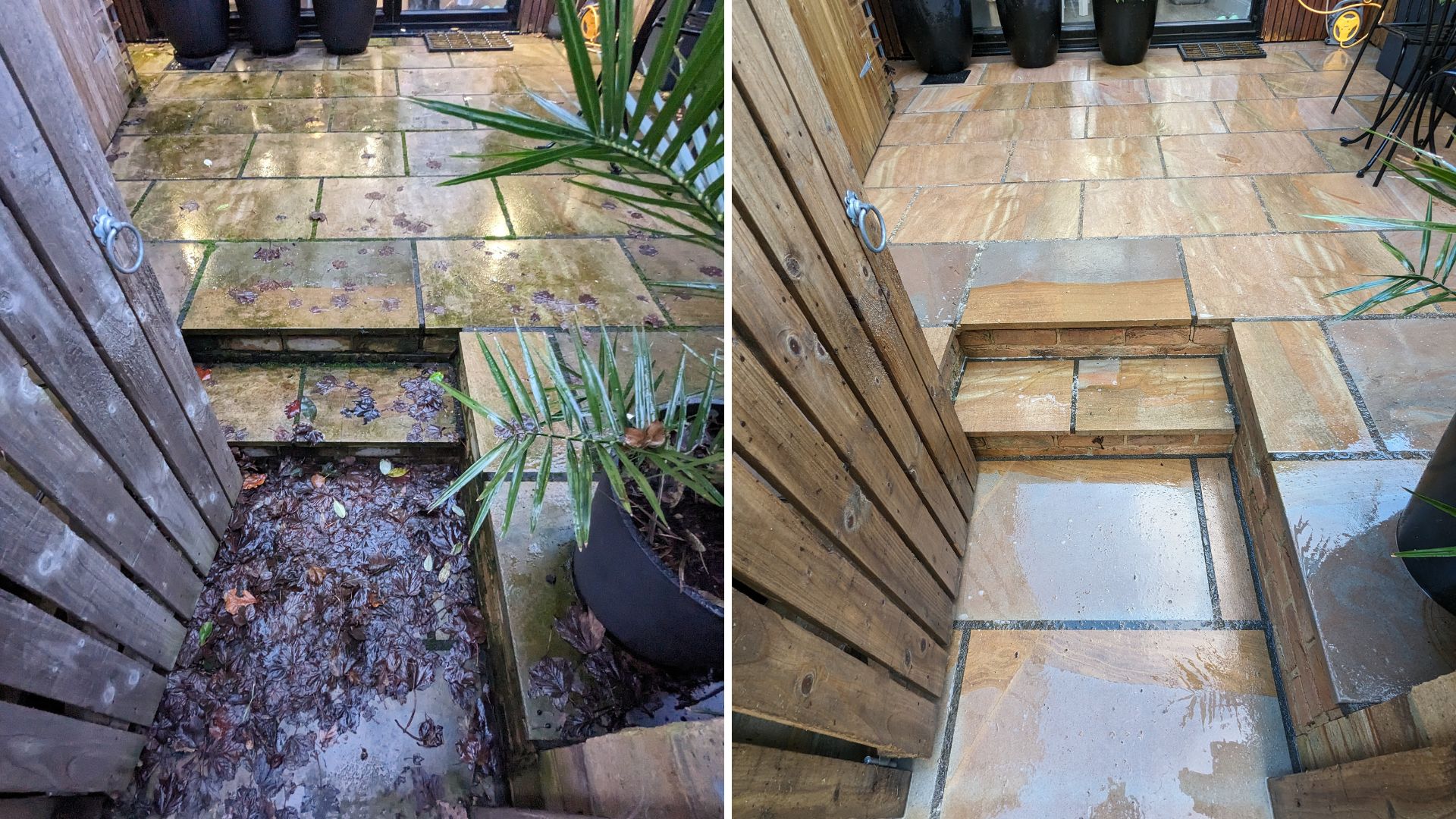
Cleaning a patio: Before and After
6. Rinse and repeat
After you've scrubbed the stones with your solution to remove any traces of dirt, you can rinse them clean with fresh water.
Depending on how ingrained the dirt is or the degree of dirtiness to begin with, you may need to repeat the whole cleaning process to get optimum results.
“Once you have scrubbed the stones, you should inspect them for any residual signs of dirt," advises Rowan. "If they are not completely clear, you can repeat the process."

7. Allow to air dry thoroughly
After the final rinse, leave the patio empty to ensure it dries through completely, not just the surface. This may take a while, depending on the temperature.
Allowing the surface to dry adequately is a vital step, similar to when cleaning outdoor rugs or cleaning outdoor cushions, to ensure no areas are left damp, as these could cause surface damage a way down the line.
"Make sure to let your stones dry out adequately before covering over them," Rowan warns, i.e. placing the furniture back into place. "As doing so could lead to moisture getting trapped and cracking the stones.”
8. Optional step – seal for protection
As an additional preventative measure, you can finish cleaning patio slabs by applying a sealant that will help to add a layer of protection against general wear and tear over the coming months.
“This step is optional, but if your stones are expensive or particularly delicate, you should apply a patio sealer," suggests Rowan. "This will help to protect from any weather damage and can even reduce the likelihood of future stains.”
We recommend the trade-rated Thompsons' One-Coat Patio and Paving Seal Clear at Screwfix.
Keeping on top of cleaning your patio slabs once cleaned will ensure that they remain in the best possible condition at all times throughout the warmer months.
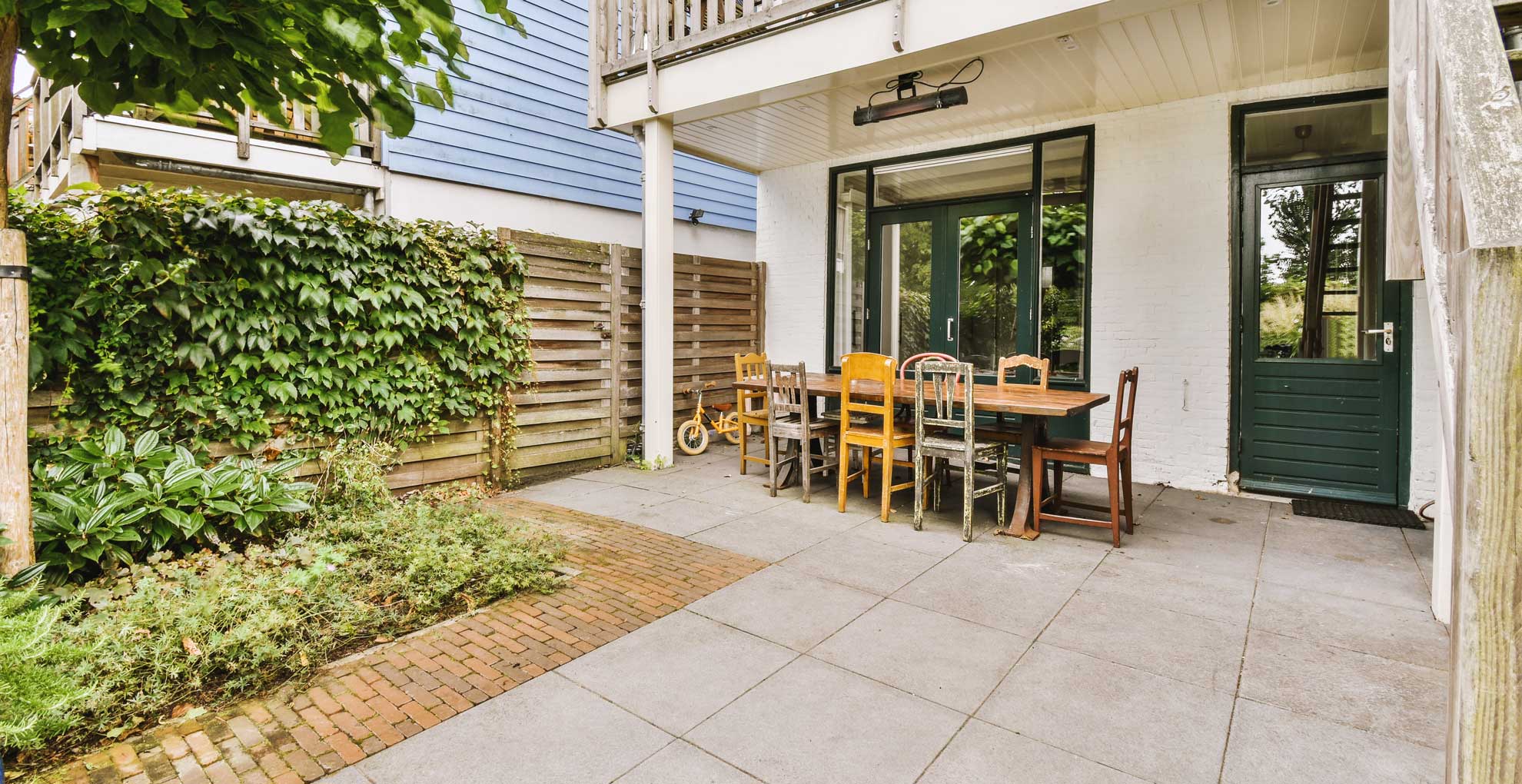
FAQ
Does white vinegar clean patio slabs?
Yes, cleaning with vinegar does work when cleaning patio slabs. In fact, the best homemade patio cleaner is a solution made by diluting white vinegar and warm water.
“Homemade cleaning solutions are usually just as, if not more effective than, store-bought solutions," says Rowan. "This is because you can add as much vinegar as necessary, meaning you can create a solution that perfectly caters to the needs of your patio.”
“After your pre-stain paving solution has soaked into the stones, you can create an effective yet cheap cleaning solution by mixing vinegar and water in a 50/50 ratio," suggests Rowan.
From cleaning windows and cleaning grout to deodorising drains, white vinegar is the best natural ingredient to avoid using harsh cleaning chemicals around the house.
However, some don't agree with using acid-based cleaning products on certain natural stones, limestone in particular, as this can cause damage.
So if you are looking at using vinegar to clean your paving stones, be sure it's suitable and always dilute it first and rinse off immediately after use. We always recommend performing a patch test on a small, inconspicuous area to ensure compatibility with your specific patio material.
What is the best thing to clean patio slabs with?
As the experts recommend, simple washing-up liquid is the best thing for cleaning patio slabs naturally without a pressure washer. While some believe using a pressure washer is the best thing to clean a patio, we would advise a gentler method because the high pressure can damage the paving slabs and the integrity of the mortar. A pressure washer can eat away at the surface.
If you are looking for a shop-bought product to clean with, try seeking a no-scrub solution. "The gentler, increasingly popular way to clean your patio at this time of year is known as 'softwashing', using a product like Monty Miracle Patio Cleaner, which is simply applied to the surface and then left for ten minutes before rinsing," says its creator, Martin Beaumont.
"The product’s unique formulation cleans away grime and grit without an invasive jetwash - a garden hose rinses away the solution with no need to apply any brute force or scrubbing."
Is there anything to avoid doing when cleaning your paving slabs?
The most important thing to consider when cleaning your paving stones is to treat them with care. As such, Rowan recommends: "researching the type of stone used to create your paving slabs, as different stones will have specific needs.
"For example, you should avoid using harsh chemicals on most stones, and never use pressure washers, wire brushes, or even metal scrapers on limestone, as these could severely damage your patio."
"Additionally, you should always ensure you rinse off all cleaning products and let your stones dry thoroughly after every treatment. Failure to do so could lead to deterioration or damage.”
"You should avoid using a pressure washer where you can," says Rowan, "as these can damage your paving stones, especially if your slabs are created from limestone.”
To avoid using a pressure washer, you can use a stiff-bristle brush as a milder alternative to get the same results – it just means you have to do more vigorous work yourself. But because you're in control of how hard you scrub the stones and the mortar, you can better assess how much pressure your patio can withstand.
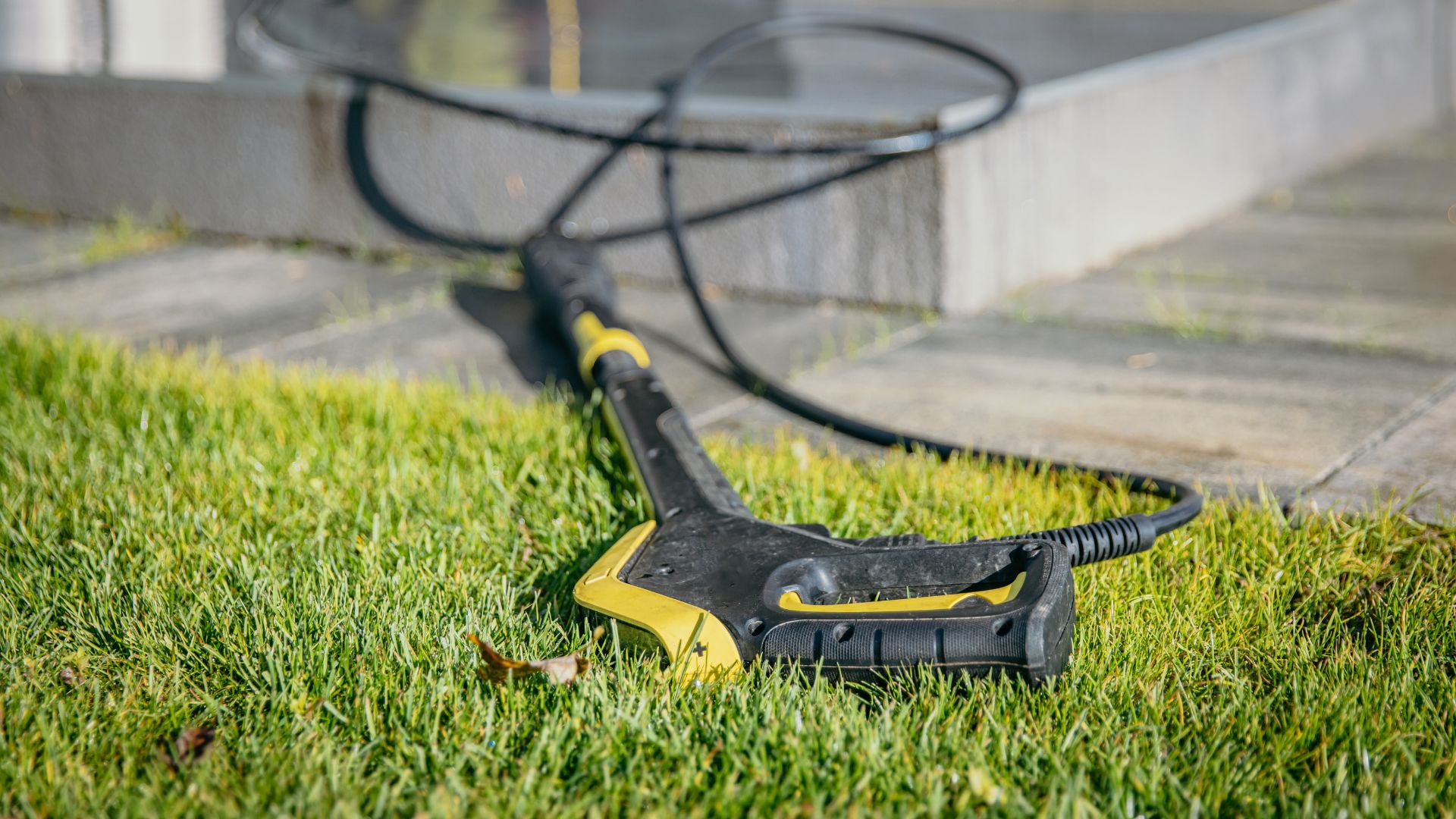
What is the best homemade patio cleaner?
If you're looking to cut costs with your gardening this year, then you can make a cleaning solution at home that's just as effective without spending any extra money.
"A simple mix of warm water and a gentle detergent is often all you need for regular cleaning. For tougher stains, baking soda mixed with water to make a paste works wonders as it’s mildly abrasive without being harsh, and safe for most surfaces," suggests Catherine Green, cleaning expert at Smol.

Having worked for the cleaning brand Smol since its creation, Catherine has tested each and every product before its release. She is also involved with the production team's process and provides feedback for the development of the company's products.
Is washing-up liquid good for cleaning patios?
Washing-up liquid is a surprising hero product that can be used to complete many daily cleaning habits, it's also great for your patio!
"Plain, non-antibacterial washing-up liquid is a great option for everyday patio cleaning. It’s gentle, effective at cutting through grime, and safe for most surfaces. Just steer clear of anything containing bleach or ammonia, as these can discolour certain types of slabs or damage sealants," explains Catherine.
Just make sure you get the right one for the task at hand. If you need some stronger stain removal, you might have to try a specialised cleaner instead.
Keeping on top of cleaning your patio slabs once cleaned will ensure that they remain in the best possible condition at all times throughout the warmer months. A sparkling clean patio is not only great for making your house look expensive from the outside but is also key for maintaining a 'quiet luxury' garden trend aesthetic.

Tamara is a highly experienced homes and interiors journalist with a career spanning over 23 years. Now the Lifestyle Editor of womanandhome.com, she previously spent 19 years working with the style teams at Country Homes & Interiors and Ideal Home. With these award-winning interior teams, she gained a wealth of knowledge and honed her skills and passion for styling and writing about every aspect of lifestyle and interiors.
A true homes and interiors expert, Tamara has been an ambassador for leading interior brands on multiple occasions, including appearing on Matalan’s The Show and presenting at top interior trend forecasting events such as the Autumn Fair and Spring Fair.
- Emily SmithDigital lifestyle writer